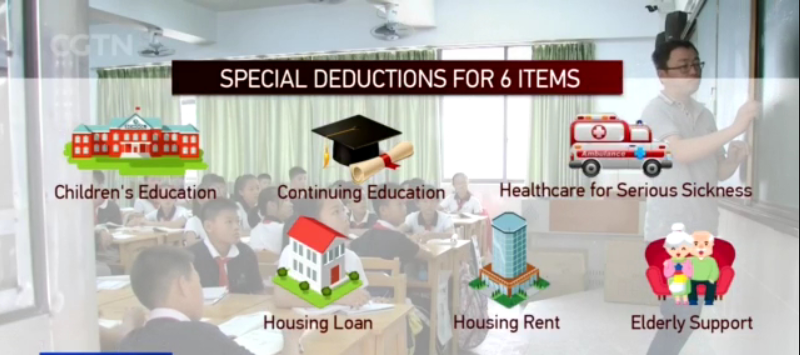
(Photo: CGTN)
To further cut individual income taxes for millions, China has drafted a list of itemized deductions, which are open to public opinion until November 4. For the first time ever, itemized deductions of this kind are part of China's income tax legislation.
Taking effect next January, the proposed measures are expected to ease tax burdens for China's low and mid-income earners.
Respectively, the six items cover expenses in education for children, continued education, healthcare for serious illnesses, housing loans, housing rent and support for the elderly.
Take children's education as an example, about 12,000 yuan or over 1,700 US dollars can be deducted each year from the parents' taxable income.
For taxpayers, their top concern is of course how much of their income tax can be cut via the proposed deduction measures.
Vita Wang, a father of two, is a project manager in Beijing. His family's monthly income could increase some 1,000 yuan in total, once the deduction measures come into effect next year and he planned to spend the saved money on extracurricular classes for his children.
Experts said that about 80 percent of all income taxpayers nationwide will benefit from the itemized deductions, especially the middle class and lower-income groups.
"In the past, we used the standardized income tax in all cases. Now the customized measures can better help ease burdens for families facing different situations. At the same time, each family is responsible for providing real information when applying for the deductions. And we have also learned some experience from developed countries who have already taken itemized deduction measures," said Professor Zhu Qing from Renmin University of China.
And it comes just after China launched new income tax rates and raised its tax baseline from 3,500 yuan to 5,000 yuan per month in October.
"Personal income tax cuts play a key role in driving China's consumption, thus boosting the economy. On the other hand, such deductions are more for social purposes as these items involve the pillars of people's livelihood: education, housing, healthcare and the aging population," said Professor Li Xuhong at Beijing National Accounting Institute.
This is among larger-scale tax cuts happening across the country to push forward a proactive fiscal policy. As experts predicted, more reform measures, especially for the value-added tax, are in the pipeline.


